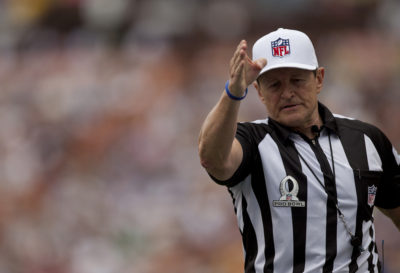
It happened on Sept. 24, 2012.
With only eight seconds left to win it, Seattle Seahawks quarterback Russell Wilson was getting desperate. In a tight-nail, low-scoring game against the Green Bay Packers, he has no other choice than to launch a Hail Mary down the field and hope for the best. And it worked, for the most part — the ball was received by none other than Seahawk Golden Tate.
But as always, there was a catch. It was also received by Packer M.D. Jennings. They scuffled over the pigskin for a while in the end zone, and the referees were split down the middle — one ruled it an interception, while the other moved it a touchdown. The play was reviewed, and, shockingly, the refs quickly decided on a Seattle catch, and therefore, a Seattle win. Beers spilled, curses were thrown and chaos ensued. But why? Because the refs got it wrong.
If this play, now famously called the “Fail Mary,” didn’t have you squirming inside, then you are either 1) lying, or 2) a Packers fan. Because this is an occurrence that all sports fans have felt and ached and screamed about at some point in their lives: the refs cost your team a win.
This is not a rare occurrence. Professional coaches and players from all leagues are constantly complaining about biased and inaccurate calls from officials, but with Red Sox ex-manager John Farrell’s firing from last week fresh in my mind, I can’t help but begin to wonder if this age-long complaint will ever subside from the fan-section.
The umpire had a weird strike zone. Red Sox 2B Dustin Pedroia was correct to question whether or not his third-strike pitch was really a strike at all during his at-bat in the second inning. But for John Farrell to go out and argue on Pedroia’s behalf, only to quickly get ejected from the game, makes me wonder if this problem is bigger than just some whiny season ticket holders complaining.
Many other players and coaches have also famously addressed the refs dilemma at press conferences before, bringing to like their own frustrations.The Arizona Cardinals beat the San Francisco 49ers in 2015, and guard Alex Boone was not shy in voicing why he believe this loss happened.
“Those refs sucked,” Boone told the Mercury News. “You call running into a player when nobody even touched you? If you don’t like what we say, then don’t like what we say, don’t throw a flag for it. That’s what I’m sick about this league. This is supposed to be a man’s game. Be a man.”
To be fair, the NFL responded to the San Francisco/Arizona game complaints by making some referee reassignments for the next week as a form of punishment, but why then why does this refs dilemma seem to not be getting any better? (Just last week, New York Jets fans were not pleased with an overturned Austin Seferian-Jenkins touchdown against the New England Patriots.)
Some believe it’s the money.
Let’s start with the basics: an NFL official’s average salary is around $188,000 a year, an MLB umpire is around $235,000, according to Bleacher Report. The main difference between these two leagues’ officials is that MLB umpires are considered full-time workers, as baseball includes a six-month-long regular season, post-season, spring training and All-Star games.
In contrast, quite predictably, NFL refs hold a very different level of occupation; many NFL refs have other primary careers, such as lawyers, entrepreneurs or even high school teachers, and consider officiating a part-time gig. But does money really make that much of a difference? MLB umpires surely make as many mistakes as NFL refs do, right?
Players are yelling at refs. Coaches are shaking their heads at refs. Fans are screaming profanities at refs. Heck, even managers are getting themselves ejected 10 minutes into the game because of refs. Articles, documentaries, blog posts and angry tweets have been created in opposition to underqualified refs.
And yet, the problem persists relentlessly, dreadful and unfixable.
Unless, of course, your team is winning, in which case, the refs are doing a great job.










